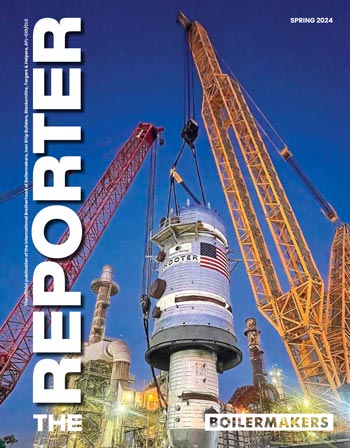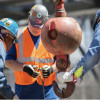In a matter of minutes, a handful of terrorists destroyed the World Trade Center and changed our way of life forever. For the first time since World War II, Americans have been forced to face the reality that we are vulnerable to attack by foreign elements who wish to do us harm.
America's response after the attack on Pearl Harbor was immediate and unmistakable. We declared war and mobilized our entire citizenry in the fight. Those who did not serve in the military served where they worked, as our nation's factories and shipyards rose to the challenge and built airplanes, ships, and guns at an unprecedented rate. The United States became the "arsenal of democracy." We built and used more ships, more airplanes, more tanks, more guns, and more ammunition than any other nation.
And all of it was made right here at home. We could never have defeated the Nazis and the Japanese without the enormous contribution of the working men and women of America who never left home. We owe our freedom today to the soldiers of that war, but we also owe it to the workers at home.
Today's war is different. Our enemy is not any particular nation, but thousands of fanatics spread across dozens of nations. Our goal is not to occupy hostile countries and establish pro-American democracies. We want only to bring those fanatics to justice and stop their murderous rampages.
The wars may be different, but the key to victory is the same. We must engage the entire citizenry in our war on terrorism. We have a good start. Polls show that Americans are more united than ever and willing to do what is necessary to eradicate terrorists wherever we find them. But first we need to get workers back on the job producing the kinds of products that keep an industrialized nation in business. To do that, the U.S. needs an industrial policy that encourages American business to make those products.
We need a policy that will rebuild our shipbuilding industry, our rail industry, and our manufacturing industries. We need an industrial policy that will keep alive those industries that provide good-paying jobs to workers and which manufacture the hard goods that the entire world buys.
Members of Congress who oppose establishing a strong industrial policy tell us that government interference distorts the market, eventually causing economic hardship.
But this argument is disingenuous. Congress has often provided economic assistance to select industries.
In the 1980s, President Reagan ended all shipbuilding loan guarantees, saying that we cannot prop up a nonprofitable industry. Then Congress voted to give the Chrysler corporation $1.5 billion to keep that one automobile maker in business. In doing so, they gave more money to one corporation than they had given the entire shipbuilding industry over the previous five years.
As a result, the U.S. shipbuilding industry was all but destroyed by foreign competition from nations that increased their shipbuilding subsidies when they saw the opportunity to take over our market share.
We lost our railroad industry, too, because Congress did not want to provide the kind of assistance it needed to build modern, high-speed passenger trains. The near-paralysis that gripped this country following the Sept. 11 attack is clear evidence of how misguided this priority was. With airlines grounded, cross-country travel virtually came to a halt.
The U.S. is the only industrialized nation that does not have a viable passenger train network. An industrial policy could have prevented us from losing that vital industry. An industrial policy can bring it back.
Imagine what our passenger rails could do with the $15 billion Congress voted to give the airlines. That figure is more than half of the total amount set aside for our passenger rail industry over the past 30 years.
Congress is riding high on an unprecedented level of support from Americans. Before that wave of strong support disappears, they need to do what is right for this country by passing an economic stimulus package that will truly stimulate the economy. The greatest stimulus to any economy is to put money into the hands of those who will spend it -- working people.
The Bush administration and most members of Congress don't seem to understand that. They passed the airline bailout, but at the president's request, they blocked an attempt to offer relief to airline workers laid off as a result of the attack.
The proposed $100 billion economic stimulus package is a wish-list of tax cuts for the wealthy, including a capital gains tax cut. Congress has economic advisors who tell them these measures won't work, but they are cynically using the public's strong support to repay their corporate backers, rather than put the money into the hands where it will do the most good -- the hands of the people who will rebuild this nation -- American workers.
President Bush has even gone so far as to suggest that giving him fast-track authority to negotiate trade agreements would somehow counter terrorism.
We don't need this kind of cynical politics. We need a president and a Congress who will do what is best for the entire country, not just a small group of campaign donors.
We need leaders who recognize the important role an industrial policy plays in keeping our country the most successful industrial nation in history.
We can't do that if Congress insists on chasing our best industries overseas. We can't do that if the president opposes every piece of legislation that benefits workers.
The American people are ready to fight terrorism. We need to know our government will give us the economic tools to do the job right.







